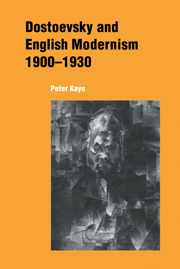Book contents
- Frontmatter
- Contents
- Acknowledgments
- 1 Introduction
- 2 Prophetic rage and rivalry: D. H. Lawrence
- 3 A modernist ambivalence: Virginia Woolf
- 4 Sympathy, truth, and artlessness: Arnold Bennett
- 5 Keeping the monster at bay: Joseph Conrad
- 6 Dostoevsky and the gentleman–writers: E. M. Forster, John Galsworthy, and Henry James
- Conclusion
- Notes
- Selected bibliography
- Index
6 - Dostoevsky and the gentleman–writers: E. M. Forster, John Galsworthy, and Henry James
Published online by Cambridge University Press: 22 September 2009
- Frontmatter
- Contents
- Acknowledgments
- 1 Introduction
- 2 Prophetic rage and rivalry: D. H. Lawrence
- 3 A modernist ambivalence: Virginia Woolf
- 4 Sympathy, truth, and artlessness: Arnold Bennett
- 5 Keeping the monster at bay: Joseph Conrad
- 6 Dostoevsky and the gentleman–writers: E. M. Forster, John Galsworthy, and Henry James
- Conclusion
- Notes
- Selected bibliography
- Index
Summary
In 1924 the self-exiled D. H. Lawrence described his ambivalent attitude towards E. M. Forster in a letter to the author: “To me you are the last Englishman. And I am the one after that.” While the comment shows an appreciation of Forster's role as the gentle humanist, it also marks the distance between his sense of cultural and social continuity and Lawrence's modernist alienation. Forster's world of Cambridge and its classical education, of assured incomes and comfortable (though rented) estates, of kindly manners and cultivated conversation was one that Lawrence perceived to be in its death throes. The genteel tradition of liberal humanism that Forster represented could not address the perpetual crisis of the modern, or so Lawrence was convinced.
Lawrence's “last Englishman” designation can also be extended to John Galsworthy. Educated at Harrow and Oxford, groomed, as a gentleman's son, for the law, and skilled in the games of the ruling elite, Galsworthy wrote novels to condemn the smug sins of his peers. Like Forster, he realized that his social standing opened doors inaccessible to those less fortunate. Even more so than Forster, he possessed a sensitive social conscience that registered innumerable oppressions and cruelties, often at the expense of turning his novels and plays into social treatises rather than art. Yet Galsworthy's heated social criticisms never threatened to jeopardize his own secure social position.
- Type
- Chapter
- Information
- Dostoevsky and English Modernism 1900–1930 , pp. 156 - 190Publisher: Cambridge University PressPrint publication year: 1999



